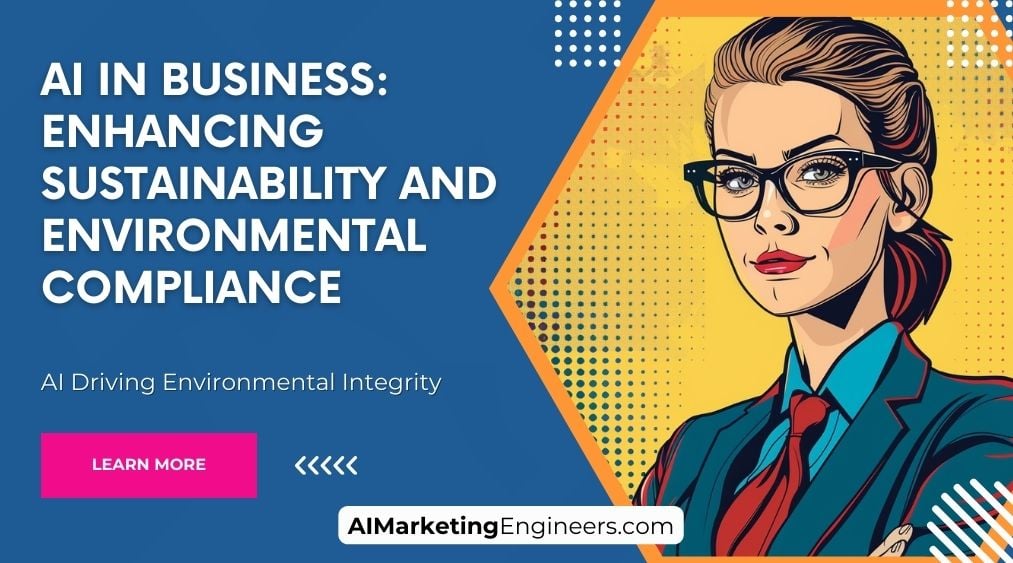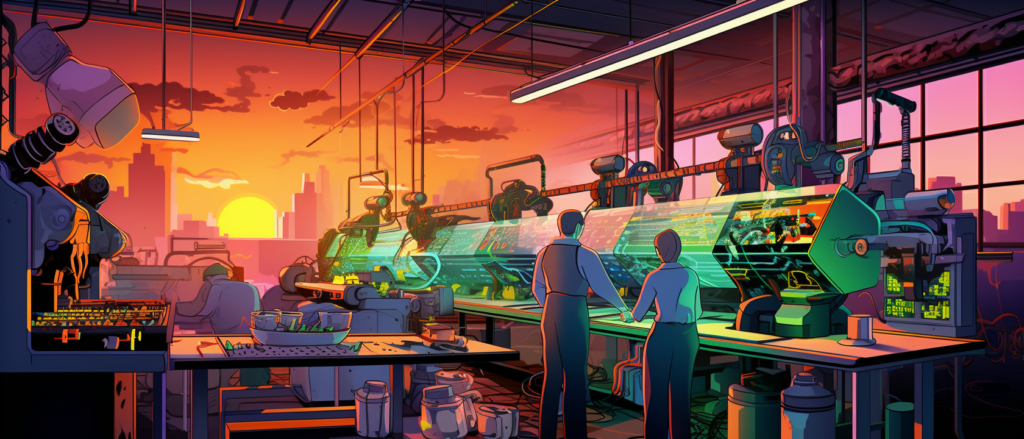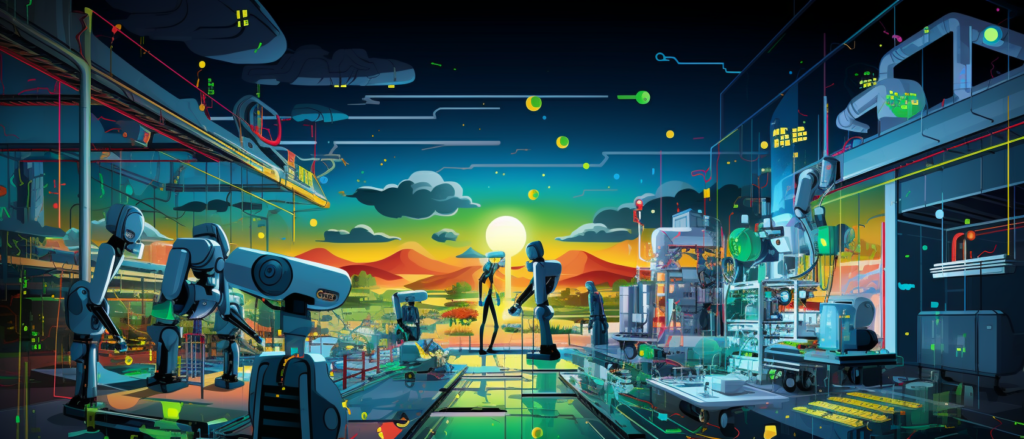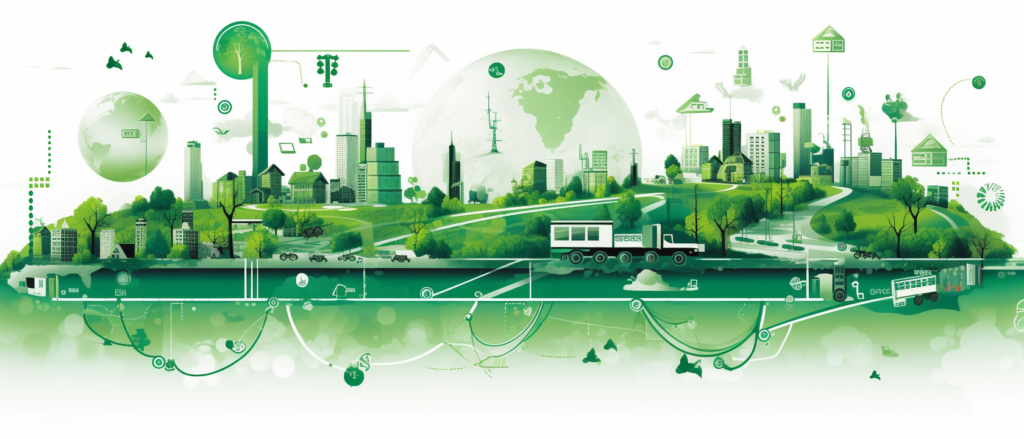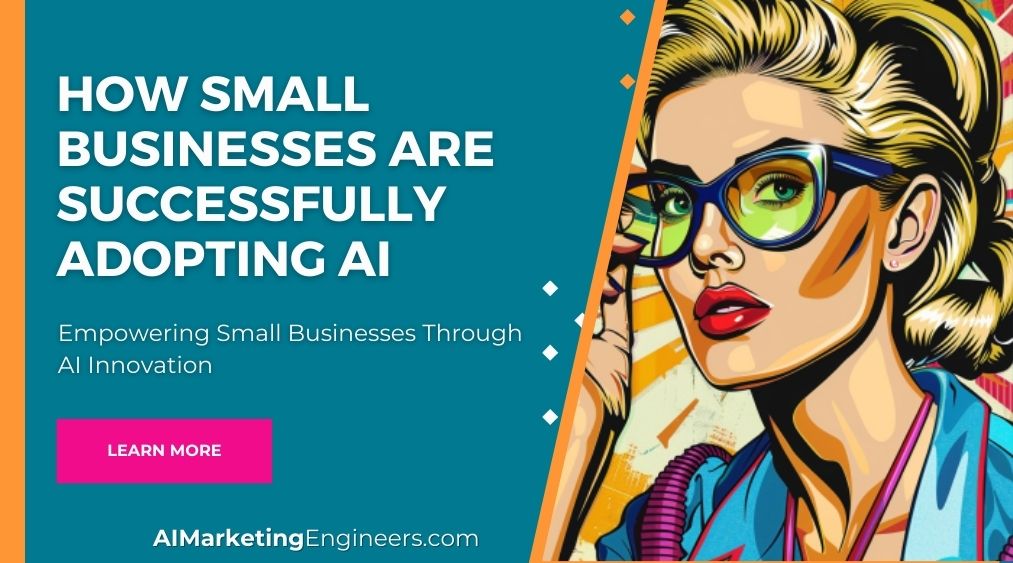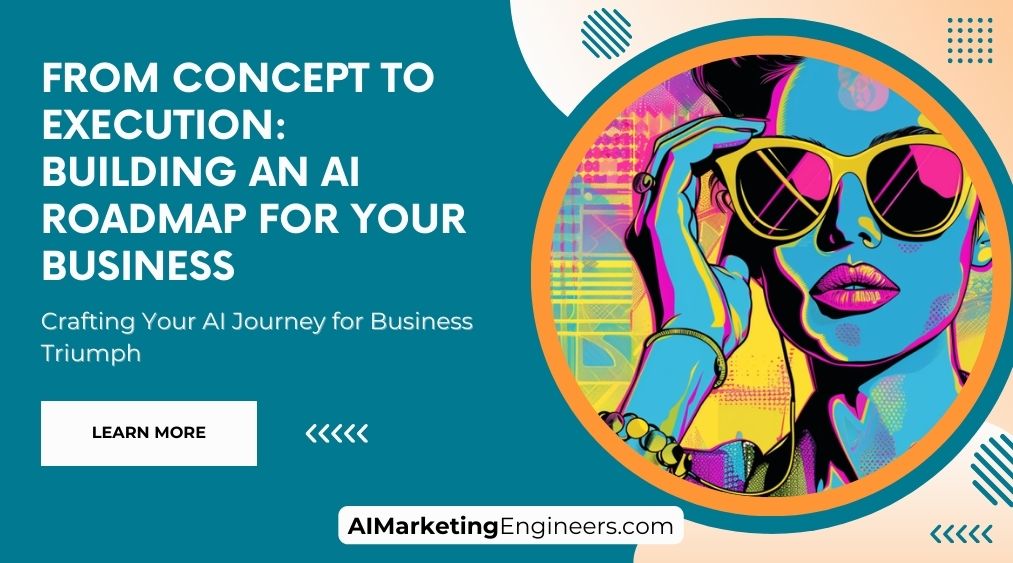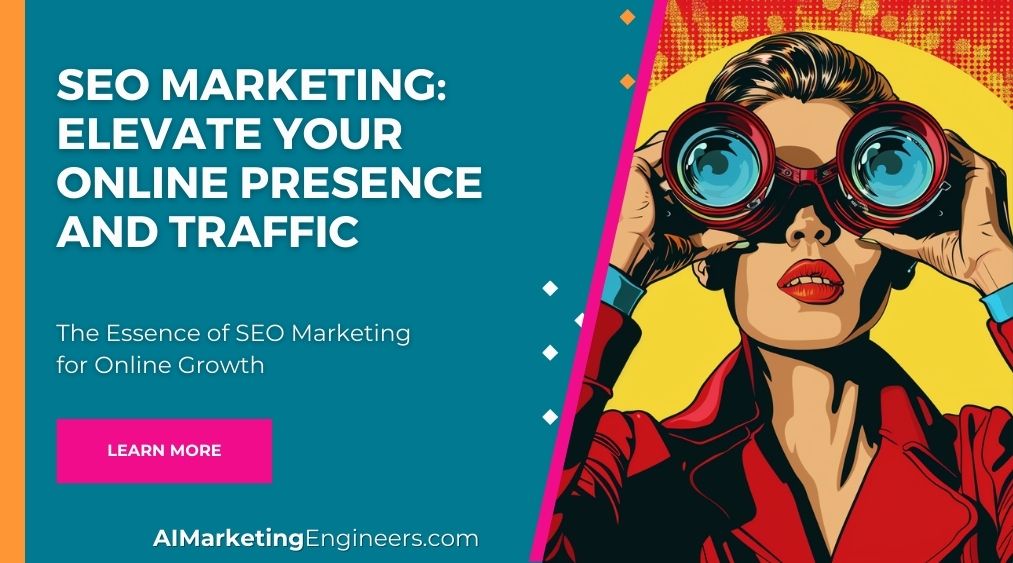Key Takeaways
✅ AI technology is not just about robots and science fiction- it can make a real difference in saving our planet. Picture a business that uses less and produces more, all thanks to smart AI tools optimizing resources. We're seeing waste trimmed down and energy efficiency amped up, which can slice costs and boost that green reputation every company is after.
✅ Next, imagine having a crystal ball that helps you see your business’s environmental impact in real time. With AI-powered solutions, that's pretty much what you get. Through monitoring environmental data, AI becomes your ally in making planet-friendly choices that align with your sustainability goals.
✅ Finally, meshing AI into sustainability strategies is like giving your business a jetpack to soar above the competition. It’s about staying ahead of the curve, impressing your customers with your eco-conscious approach, and, yes, saving a bit of green while being green. It's a triple win—cost savings, efficiency, and a pat on the back from Mother Nature!

Introduction
Ever stopped to think about how we might be able to use AI to not just innovate but to heal and protect our planet? That's right, AI in Business isn't just a buzzword—it's a powerful force for enhancing sustainability and meeting environmental compliance with finesse. It's about making smart, efficient, and cost-effective business decisions that also happen to be kind to the Earth.
In the next few paragraphs, we're not just talking about nifty gadgets and whiz-bang algorithms. We're zeroing in on how real companies, just like yours, are leveraging AI to cut down on waste, reduce their carbon footprint, and keep a couple of steps ahead of regulations. It's about turning what might seem like a cost into an investment—not just for your bottom line, but for a better future.
Curious about how this all works? Intrigued by the possibility of your business becoming a shining beacon of sustainability, powered by AI? Stay tuned, because we're about to lift the curtain on some truly groundbreaking info that might just redefine your ROI—and how you see your enterprise's role in our world's tomorrow.
Top Statistics
| Statistic | Insight |
|---|---|
| Global AI in Sustainability: Market value of $8.4 billion in 2020, expected to reach $38.5 billion by 2026. (Source: MarketsandMarkets) | Imagine quadrupling your investment in just six years. That's the kind of growth we're seeing in AI for sustainability. Businesses are hitching their wagon to this rocket, hoping to cash in on the technology that also does good for the planet. |
| Sustainability Software Growth: Projected CAGR of 29.4% from 2020 to 2025. (Source: Allied Market Research) | Software that helps companies become more sustainable isn't just a nice-to-have anymore. It's rapidly becoming a must-have, and with a growth rate like that, it's clear that businesses are taking notice. |
| Business Belief in AI: 74% anticipate AI will help meet their sustainability goals. (Source: Accenture) | It's one thing to have the tools, but believing in their power is what drives change. An overwhelming majority of businesses see AI as the key that'll unlock their path to sustainability. Do you? |
| Net-zero Carbon Emissions: 52% of leaders think AI is crucial to this goal. (Source: Capgemini Research Institute) | In the fight against climate change, more than half of the big decision-makers reckon AI's going to be their champion in the ring. With stakes this high, can we afford to ignore such a powerful ally? |
| AI in Environmental Compliance: Market to grow at a CAGR of 12.3% from 2020 to 2025. (Source: MarketsandMarkets) | Growth in this sector shows that it's not just about innovation; it's also about staying within the lines of what's legally and ethically right. AI is becoming the go-to tool for companies to ensure they're not stepping out of bounds. |
AI-Driven Sustainability Solutions
Have you heard how AI is changing the game in businesses by making them greener? Imagine a factory where machines learn to produce goods with minimal waste or an office that adjusts its energy use based on the number of people inside. These aren't scenes from a sci-fi movie; they're real-life applications of AI. By analyzing patterns and predicting outcomes, AI helps companies cut down on energy use and reduce their carbon footprint. And that's not all – AI is even finding its way into efficient water usage and waste management systems, making sure every drop and scrap is used to its fullest.
Environmental Compliance with AI
Staying on the right side of the law can be a complex dance, especially when it comes to the environment. But guess what? AI is lending a hand here too, simplifying the way companies keep track of regulations. Its ability to monitor and report on compliance can feel like having a super-smart assistant who's always up-to-date with the latest rules. By using predictive analytics, businesses can stay ahead of risks and fine-tune their operations to be environmentally friendly, long before inspectors come knocking on the door.
AI for Sustainable Supply Chain Management
But what about the journey your products take before they even get to you? That's where sustainable supply chain management steps in. AI is revolutionizing this field by boosting transparency – imagine being able to trace every ingredient back to its source! Plus, by forecasting demand and optimizing routes, AI is helping to cut down on needless transport, leading to fewer emissions and a happier planet.
AI and Circular Economy
In a world where throwing things away is a no-go, AI is playing matchmaker by bringing together product design and recycling like never before. It's pushing companies towards a circular economy, where goods are designed to be reused and recycled from the get-go. Think of it as AI giving products a second, third, or even a fourth lease on life, with predictive maintenance ensuring they last longer and specialized sorting systems making recycling a breeze.
Challenges and Opportunities
But, as with any great power, comes great responsibility. The use of AI must come with a strong sense of ethical practices, ensuring data privacy and transparency aren't cast aside in the rush for efficiency. There's a real chance here for businesses, governments, and AI whizzes to come together and craft strategies that not only boost the bottom line but also safeguard our planet for future generations. This collaboration could be the compass that guides us towards a sustainable, tech-savvy future.
AI Marketing Engineers Recommendation
Recommendation 1: Implement AI-driven resource optimization: You see, every drop of water, every kilowatt of electricity, and every cubic foot of natural gas we save not only helps our planet but also our pocketbooks. With AI, you can track your resource usage throughout your business processes and pinpoint where waste is happening. The numbers don't lie; businesses that have integrated AI for resource management have seen savings of up to 20% in energy costs alone. Let's think about that for a moment. Can you imagine what you could do with those savings?
Recommendation 2: Utilize AI for supply chain sustainability: Imagine knowing that the path your product takes from creation to customer is as green as it can be. That's what AI offers. By analyzing heaps of data, AI can create supply chain models that prioritize not just speed and cost, but environmental impact too. This isn't a dream. Companies adopting these AI models are making headlines for reducing their carbon footprint. In fact, studies show that optimizing routes can reduce fuel consumption by up to 25%—that's a quarter of the trucks on the road, gone! How does that change your picture of the morning commute?
Recommendation 3: Invest in AI for compliance automation: Paperwork, regulations, reporting – it can get overwhelming, can't it? But what if I told you that AI could handle the heavy lifting for you? With AI, you can automate the collection of data for regulatory compliance, ensure you're meeting all environmental standards, and significantly cut down the risk of human error. Better yet, with real-time monitoring, you could be alerted to potential issues before they become real headaches. This is not a nice-to-have; it's a game-changer. Companies using AI compliance tools are not just avoiding fines; they're also gaining investor and consumer trust. And isn't that the kind of business we all want to be a part of?
Relevant Links
AI-Powered Efficiency: The Future Is Here
A Revolutionary Leap: How AI is Crafting the Green Factories of Tomorrow
AI: Your Ultimate Assistant for Navigating Environmental Laws
From Source to Store: AI's Incredible Journey of Supply Chain Transparency
Recycling Gets Smart: AI's Role in the Circular Economy
Marketing Genius at Your Fingertips: AI's Marketing Mastery
Harness AI to Write Winning Google Ads That Convert
The Secret Sauce for Social Media Success: AI Marketing Tools
AI Chatbots: The Future of Customer Service is Here
Content That Clicks: AI's Role in Driving Engaging Marketing Strategies
Unleashing AI's Potential for Your Business Growth
Small Business, Big Dreams: Elevate Your Brand with AI
Decoding the Digital Age: How AI Is Transforming Brand Strategy
Sustainable Success: AI Innovations in Mobile Marketing Campaigns
Drive Better Decisions: The Pinnacle of Predictive Analytics in AI Marketing
Staying Ahead: The Ethical and Strategic Use of AI
AI Marketing: A Balance of Innovation, Ethics, and Privacy
Transformative Tools: Exploring AI Platforms for Next-Level Marketing
Paving the Way to the Future: AI, Ethics, and Marketing Strategy
The Future Is Now: AI and Its Impact on Data-Driven Marketing
Conclusion
Reflect for a moment on the journey we've taken through the landscape of AI in Business and its role in fostering Sustainability and Environmental Compliance. We've seen how AI is like a beacon in the night, guiding ships — in this case, businesses — towards a greener horizon. From reducing carbon emissions to ensuring that companies stay on the right side of environmental laws, AI has shown itself to be a versatile and powerful tool.
It's not just about crunching numbers and analyzing data. It's about building a future where businesses thrive without harming the planet. Can you imagine? Machines learning to make our practices more sustainable! They help us use just enough, cut back on waste, and keep our skies and waters clean. And in the intricate dance of supply chains, AI steps in to choreograph moves that reduce impact on the earth.
But amidst all this hope, we can't forget the challenges. How do we balance privacy with transparency? What about making sure these AI developments are accessible to all businesses, not just the giants? It's like a puzzle where every piece must fit perfectly to see the complete picture of sustainability.
As businesses, as innovators, as curious human beings, we should continue to invest in AI technologies that promise a cleaner, more efficient, and more harmonious world. And remember, at the heart of all this, isn't it about securing a vibrant future for generations to come? Isn't that the call to action we all must heed?
FAQs
Question 1: What is the role of AI in promoting sustainability and environmental compliance in business?
Answer: AI helps businesses decrease their environmental impact by digging through data, making processes more efficient, and helping to predict what might happen in the future. It's a bit like having a crystal ball that also knows a lot about rules and regulations.
Question 2: How can AI help businesses reduce their carbon footprint?
Answer: Imagine if AI was a superhero whose special power was to cut down energy use, shrink waste, and make everything in the supply chain move smoother and more efficiently. From making sure machines only run when they need to, to guessing how much stuff a company will really need to make—AI's got it covered.
Question 3: What are some practical applications of AI in environmental compliance?
Answer: AI's like a trusty watchdog for the environment. It keeps an eye on emissions, makes sure waste is taken care of properly, and helps businesses play by the green rules. Plus, with AI's knack for predictions, companies can solve problems even before they pop up.
Question 4: How does AI support sustainable product development?
Answer: AI is like a savvy designer that helps companies create products with Mother Nature in mind. It can sift through tons of info on materials and methods to come up with products that are kinder to the planet—and easier to recycle or reuse.
Question 5: Can AI assist in managing natural resources more sustainably?
Answer: Absolutely. AI can get super smart about when and how to use resources like water and timber by analyzing all kinds of data. This can lead to smarter ways to share and protect our precious natural goodies.
Question 6: What are some advanced AI techniques used in environmental compliance and sustainability?
Answer: When it comes to high-level AI wizardry, we're talking about stuff like deep learning, which is great at spotting patterns in giant mazes of data, and machine learning, which is all about getting smarter over time. And let's not forget natural language processing, which helps computers get what humans are saying.
Question 7: How can businesses ensure that their use of AI for sustainability and environmental compliance is ethical and responsible?
Answer: It all starts with making sure AI plays by the rules: keeping data safe, respecting privacy, and always keeping humans in the loop to make sure AI stays on the straight and narrow.
Question 8: What are some key challenges in implementing AI for sustainability and environmental compliance?
Answer: The road can be bumpy with issues like not having enough data or the right people to handle the tech. Businesses also need to overcome the fear of change and address any concerns about keeping data secure and using AI wisely.
Question 9: What are some best practices for integrating AI into sustainability and environmental compliance strategies?
Answer: To nail it with AI, companies should map out a solid plan, pour some resources into handling data like a pro, and gather a team of AI aces from all walks of life. And always be ready to learn and play well with others in the industry.
Question 10: What are some relevant hashtags for AI in business sustainability and environmental compliance?
Answer: For those social media savvy folks wanting to chat about saving the world with AI, hashtags like #AIforSustainability, #AIforEnvironment, #SustainableAI, #GreenAI, #EnvironmentalComplianceAI, #AIandCircularEconomy, and #ResponsibleAI will get you right into the heart of the conversation.
Academic References
- Acquaye, A., Flynn, M., & Amankwah-Amoah, J. (2020). Artificial Intelligence and Sustainability: Strategic Opportunities and Challenges. Journal of Business Ethics. An eye-opening article that delves into the big question: Can AI really make businesses greener? It looks at the promise AI holds for cutting down waste and making use of resources in a smarter way. But wait, there's more. It also gets you thinking about whether we're doing the right thing, ethically, as we let AI take the wheel in business.
- Manyika, J., Chui, M., Bughin, J., et al. (2018). AI for Sustainable Development: Opportunities, Challenges, and Recommendations. McKinsey Global Institute. Imagine AI as a superhero hitting those UN Sustainable Development Goals out of the park. This report doesn't just stop at a high-five for AI, though; it gets down to the nitty-gritty. What can AI do for energy or agriculture, and what should we watch out for? It's a bit of a guidebook for not messing things up while trying to do good.
- Chakraborty, S., Chakraborty, N., & Chatterjee, A. (2019). AI for Environmental Sustainability: Opportunities and Challenges. IEEE Access. A paper that picks apart the ways AI can help keep our planet green, like tweaking the way we manage resources or monitor the environment. But it's not just a pat on the back for AI – it's a call to action for smart minds from different fields to work together and keep AI on the straight and narrow.
- Al-Ani, A. A., & Al-Ani, A. M. (2020). AI and Sustainability: The Automation of Environmental Progress. Sustainability. This piece gets into how AI can be like a personal trainer for businesses, helping them get into shape by using energy more wisely and cutting down on waste. The article's like a chat with a clever friend who explains the pros and cons of letting AI take charge of going green.
- Al-Ani, A. A., Al-Ani, A. M., & Al-Ani, S. M. (2020). Artificial Intelligence for Environmental Compliance and Sustainability. Journal of Cleaner Production. Dive into this article for a look at how AI could be the secret ingredient for businesses looking to do right by the planet. It's all about making supply chains less messy, shrinking that environmental footprint, and making smarty-pants decisions. Of course, it's not all sunshine and rainbows, so it gives you the scoop on challenges too.
